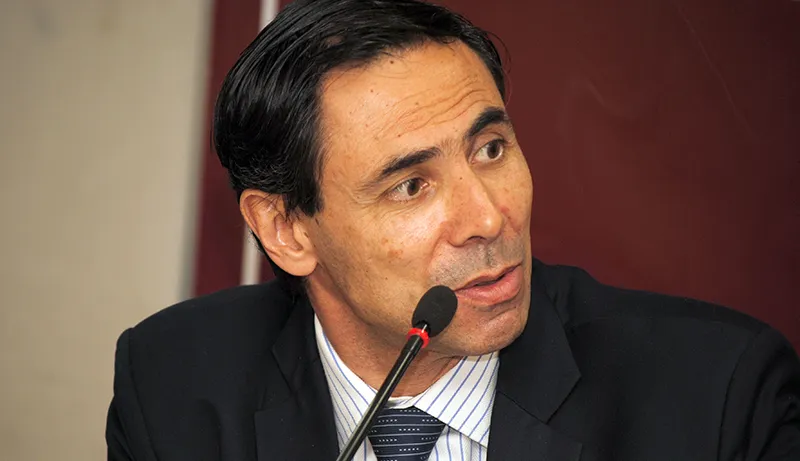Brazil's Ambassador to India, Mr Carlos Duarte, thinks that trade between Brazil and India should grow not just in absolute terms but also in qualitative terms.

Brazil’s Ambassador to India, Mr Carlos Duarte, thinks that trade between Brazil and India should grow not just in absolute terms but also in qualitative terms.
Speaking on ’The Economic and Political Aspect of India and Brazil’ at Observer Research Foundation on March 11, 2014, the Ambassador said while the trade, which stands at 10 billion now, is expected to keep growing, there are some challenges in trade which need to be fixed. As of now, the trade is expected to cross 15 billion in 2015.
The Ambassador pointed out that there is a major concentration on primary products. Brazilian exports of crude oil cover more than half the trade which is then imported from India in the form of diesel fuel. While there is value addition, the Ambassador said it should be more technology intensive.
He noted that the relations between India and Brazil are based on the ethos of two large democracies which have not only multicultural and pluralistic aspects but also similar developmental aspirations. The countries have had strong bilateral relations -- bilateral trade currently stands at 10 billion. On the multilateral front, India and Brazil have cooperated in a number of forums like the G20, BRICS and IBSA on a variety of issues be it expansion of the Security Council in the UN or representing the interests of the emerging market economies.
The Ambassador explained Brazil’s economic and political standing and how it plays into the India-Brazil relationship. He pointed out that Brazil is the largest South American country with a population of 198.7 million. As far as macro-economic performance is concerned, Brazil has recently reported an unemployment rate of 4.6% which is considered historically low implying the remarkable level of labour force absorption, thus, bringing the Brazilian economy at almost full employment.
However, there is much improvement to be seen on Brazil’s GDP growth front, with growth reduced to an unimpressive 2.3% currently from 7.5% in 2010, he said. An interesting aspect of the Brazilian economy, as pointed out by the Ambassador, is the reduction in the Gini Index for Brazil. Brazil is going through a major social change with a large growth in its middle class. This increase in the middle class has led to a growing consumer market. Brazil has also witnessed a decreasing trend in the interest rate which comes as a refreshing change after struggling for years with inflation and high interest rates.
On the India-Brazil relations front, the Ambassador pointed out that the two countries have enjoyed a positive and easy relationship for a long time. Relations became more intense in the1990s after the opening up of both economies and setting up of the Brazil-India Joint Commission in 2012 and a strategic partnership in 2006. Quantitatively, the trade figures for the two countries show extraordinary growth -- there has been a ten-fold increase in ten years from 1 billion to more than 10 billion in 2012.
The talk was chaired by Mr Viswanathan, Distinguished Fellow, ORF and a former Ambassador to African nations. He highlighted the role of various groupings like the G20, G4, BRICS and IBSA leading to further cooperation between the two countries and intensification of the relationship. The G4 is striving for expansion of Security Council and India and Brazil stand on the same footing that it can no longer be kept out of the international agenda and is long overdue.
Mr. Hardeep Singh Puri, Mr. Deepak Bhojwani, former ambassadors, and Dr. Parthasarathi Shome, a tax expert, were the panellists for the discussion that followed. Mr. Puri said there is need for increased connectivity between India and Brazil. He said lack of connectivity goes against economic sense and it remains the first step towards improving bilateral relations. Mr Bhojwani went one step ahead and pointed out the need for solid economic linkages that go beyond connectivity, especially in investment and complementary areas in order to achieve the 15 billion trade target. Dr. Shome shed some light on the complexity of the tax system and fiscal policy in both the countries. According to him, reforms in the current consumption taxation system, which is a consequence of fiscal federalism in both countries, can go a long way in improving both economies.
Ambassador Duarte said both India and Brazil have similar views in most issues including international crisis and benefit from coordinating with each other while there remain many potentialities to explore.
Welcoming Ambassador Duarte and the panellists, ORF Senior Fellow Jayshree Sengupta highlighted the issues of connectivity and furthering bilateral relations.
(This report is prepared by Puja Suri, Research Intern, Observer Research Foundation, Delhi)
The views expressed above belong to the author(s). ORF research and analyses now available on Telegram! Click here to access our curated content — blogs, longforms and interviews.




 PREV
PREV

